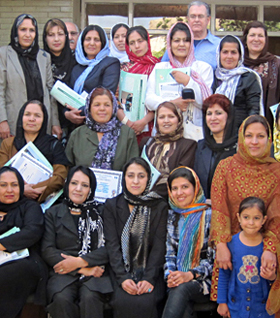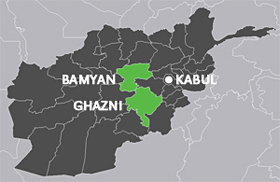Since 1992, more than 8,500 teachers in Afghanistan have attended training workshops to improve their English skills and teaching methodology.
The Center uses a master teacher-trainer model, in which selected instructors attend extended workshops in Kabul or the United States and then, in turn, go to their home villages in the provinces and train their colleagues.

Participants
About 85% of the workshop participants have been female, providing employment and a sense of self-worth to women who were marginalized by the Taliban. Professionalizing the Afghan teacher corps remains a top priority.
While the country now has an estimated 90,000 teachers, only about 36,000 of them are professionals.
Bamyan and Ghazni
Recently, UNO’s teacher-training efforts have focused on the provinces of Bamyan and Ghazni, to the west and southwest of Kabul. UNO brought teachers from both provinces to Kabul for in-service training. Those teachers then returned to their home schools and disseminated the lessons in English language and teaching methodology to their colleagues.
Because travel can be difficult and many female teachers have family obligations, UNO also brought teacher-training seminars directly to the Teacher Training College in Ghazni.
UNO employed Afghan trainers, who worked with CARS staff in Kabul and an ESL instructor in Omaha to develop the curriculum. Trainees learned and practiced with one another before returning to their classrooms and sharing new techniques with other teachers throughout Bamyan and Ghazni.
Building upon UNO’s many years of teacher training and ESL programs in Afghanistan, the teacher-training efforts for Bamyan and Ghazni were sponsored by the U.S. Department of State’s Bureau of South and Central Asian Affairs.
Read a summary of the Teacher Training Seminar on Nov. 2018
Read a summary of the Teacher Training Seminar on Dec. 2018
